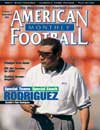Article CategoriesAFM Magazine
|
Special Delivery: Pete RodriguezSeattle\'s Pete Rodriguez consistently delivers great special teams.Lubbock Avalanche-Journal © More from this issue Pete Rodriguez has a motto to match his moxie. Here it goes: No matter how nervous he might get sometimes as the special teams coordinator of the Seattle Seahawks, the blood, sweat and tears of his work are the last thing you'll see on his sleeve, skin or collar. "Don't ever let them see you sweat,'' Rodriguez said. "I try to believe in that commercial. You need to have control, and however you handle it, reflects your own personality. Some guys are real vocal and holler and scream. I don't.'' The low-key Rodriguez doesn't like to brag and boast about anything, either, but there are at least two good reasons why his NFL career is something to be studied at length. Number one, he's become a master technician at one of the most detailed and nerve-rattling positions in professional football: special teams coach. Number....The full article can only be seen by subscribers.
|
|
|||||||
| HOME |
MAGAZINE |
SUBSCRIBE | ONLINE COLUMNISTS | COACHING VIDEOS |
Copyright 2025, AmericanFootballMonthly.com
All Rights Reserved





